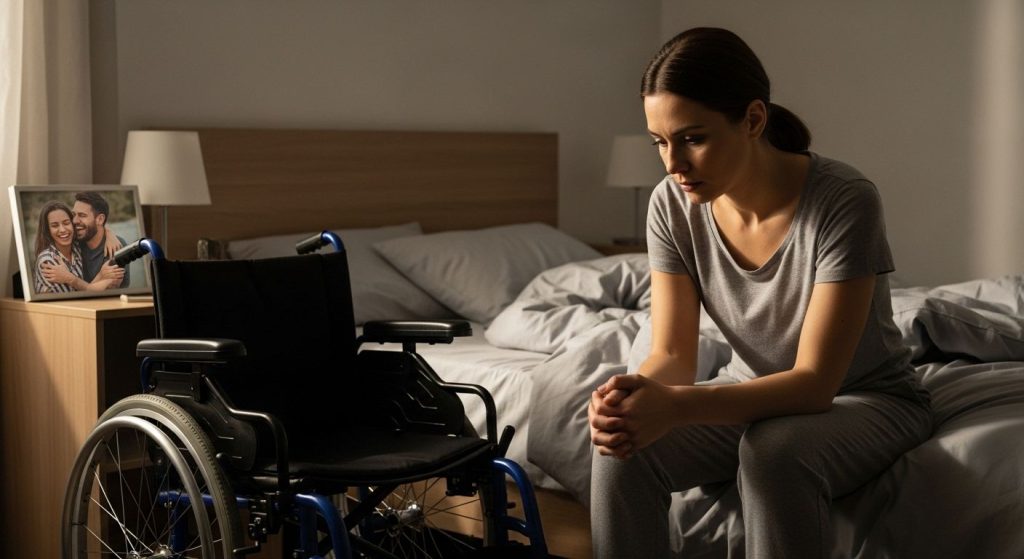Contact us today
The Realities of Intimacy for Women After Spinal Cord Injury
After spinal cord injury, a lot of women usually get advice on how to manage mobility, independence, and emotional challenges. But here’s what nobody discusses in SCI spaces: intimacy, desire, and sexual health. The real conversations about feeling desirable, navigating changed sensation, and wondering if intimacy is still possible.
Maybe you’re worried about how your body looks or functions now. Maybe you’re afraid of being “too complicated” for a partner. Maybe you’re grieving the excitement you’ve lost, and wondering how tough intimacy after SCI can be.

If these thoughts feel familiar, you’re not alone. At HerSpine Solutions, one of our goals is to break the silence around intimacy after SCI with honest conversations about what women actually experience and need to know. Because you deserve honest information about this deeply personal topic that is important to your wellbeing, self-image and relationships.
Sexual Function After SCI
Spinal cord injury changes the way your body experiences and responds to touch, but it doesn’t erase your capacity for intimacy, pleasure, or desire. What changes is how you connect with your body.
After SCI, the nerves that carry sensations between the brain and the sexual organs may be affected, depending on your injury level. This can influence things like lubrication, arousal, and orgasm, but it doesn’t mean pleasure is gone. It simply means pleasure might look and feel different now.
For many women, these are some of the changes and adaptations they notice:
1). Sensation changes: Areas below your level of injury may have reduced or altered feelings. However, many women discover new, heightened sensitivity above the injury level, such as around the neck, shoulders, ears, lips, and breasts. Learning these new erogenous zones can open up new ways to experience pleasure and closeness.
2). Lubrication: Vaginal lubrication may decrease because of nerve involvement or certain medications. Using water-based lubricants can help make intimacy more comfortable. Remember, needing lube isn’t a failure; it’s a form of self-care and adaptation.
3). Orgasm: Some women with SCI continue to experience orgasm through direct or indirect stimulation, while others describe different forms of pleasure, a warm rush, full-body relaxation, or “phantom” sensations that aren’t localized but still deeply satisfying. Even if the pathway changes, your capacity for pleasure remains.
Beyond the physical, sexual confidence can be influenced by how you see yourself and how safe and accepted you feel with your partner. SCI can bring new insecurities, but it can also invite deeper communication, vulnerability, and creativity in intimacy.
The key is to explore without pressure, listen to your body, and define pleasure on your own terms. Your sexuality didn’t end with your injury; it simply evolved.
Staying Safe and Comfortable During Intimacy
Before you explore sexual intimacy after SCI, it’s good to understand these safety concerns:
1). Autonomic Dysreflexia:
Some women with spinal cord injuries may experience autonomic dysreflexia: a sudden spike in blood pressure caused by triggers like a full bladder, tight clothing, or intense stimulation during intimacy. Not everyone with SCI experiences it, but awareness helps you prepare and respond quickly.
If AD happens, you might notice a pounding headache, flushed skin, sweating, or anxiety. If you do, stop what you’re doing, loosen any tight clothing, and address possible triggers (like emptying your bladder). Always talk to your healthcare provider about how to recognise and manage AD before resuming intimacy.

2). Pain or Discomfort:
Pain during intimacy (dyspareunia) can occur due to muscle spasms, tightness, nerve changes, positioning challenges, or dryness. But pain isn’t something you should just “get used to.” If intimacy becomes uncomfortable, try experimenting with different positions, use plenty of lubrication, and take breaks when needed.
If you notice bleeding, odour, or ongoing discomfort, speak with your healthcare provider. There might be an underlying cause that can be treated.
3). Bladder and Bowel Management:
One of the biggest concerns for women with SCI is the fear of accidents or leaks during sexual activity. This anxiety can cause stress that affects overall sexual function, but being prepared can help you feel more relaxed and confident.
a). Empty the bladder and bowel before intimacy to reduce discomfort and AD risk.
b). Reduce pressure on your bladder and ease penetration by using a pillow under your pelvis to tilt it upward.
c). If you use a catheter, tape the outer end to your inner thigh to keep it out of the way and prevent friction.
Remember, this isn’t about perfection. It’s about feeling relaxed and ready so you can focus on connection, not anxiety.
4). Skin Protection:
Reduced sensation means it’s sometimes harder to notice irritation or skin injury during intimacy. Skin awareness is self-care, not vanity.
a). Experiment with positions that reduce pressure or rubbing on sensitive areas.
b). Check your skin for redness, pressure spots, or sores after intimacy.
c). Always use adequate lubrication to prevent dryness and tearing.
Intimacy after SCI takes patience, communication, and creativity, but safety and pleasure can absolutely coexist. When you understand your body’s responses, you reclaim confidence and can focus on what really matters: closeness, connection, and joy.
Rebuilding Intimacy After SCI
Understanding the physical changes after SCI is important, but knowing how to nurture and rebuild intimacy matters even more. Intimacy after spinal cord injury may look different, but different doesn’t mean less fulfilling; it can actually become deeper, more intentional, and more connected.
Communicate With Your Partner
Talking about your sexual needs after SCI can feel vulnerable, but open communication is the foundation for rediscovering intimacy. Your partner might also be unsure, afraid of hurting you, or simply unaware of how your body now responds. Honest conversations create safety and trust for both of you.
a). Talk openly about what feels good, what doesn’t, and any changes you’re noticing, whether physical or emotional.
b). If it’s hard to start these conversations, consider couples counseling or sex therapy with someone who understands SCI.
c). Share articles or resources (like this one) to help your partner understand your experience.
d). Keep playfulness alive; intimacy is not only about sex but also laughter, closeness, and shared joy.
e). Explore non-sexual touch like massages, cuddling, or simply spending quiet time together to strengthen emotional connection.
Remember, your partner is also learning and adapting. Be patient with each other and keep communication ongoing, not just when something feels wrong, but also when something feels right. Intimacy after SCI is a journey of rediscovery, not loss.
💡If you’re pursuing new relationships, check our newsletter on navigating dating after a spinal cord injury.

Use Positioning Aids
Using adaptive equipment isn’t about compensation; it’s about comfort, creativity, and confidence. Just like a wheelchair supports mobility, sexual aids can support pleasure, safety, and ease. There’s no shame in exploring what helps you feel good, especially when it brings comfort and control back into your hands. You can use:
a). Positioning pillows or wedges for support and better angles
b). Adaptive furniture or transfer-friendly surfaces that make movement easier
c). Water-based or silicone lubricants to prevent friction, reduce dryness, and make intimacy more enjoyable
d). Bed handles or rails for stability and positioning assistance
Whenever you feel unsure, remind yourself that your comfort and pleasure matter deeply.
a). Speak to occupational therapists familiar with SCI intimacy needs.
b). Experiment with your partner to discover what feels good for both of you.
c). Look up disability-friendly shops that understand privacy and inclusive intimacy.
Using tools that enhance pleasure isn’t weakness; it’s wisdom. It’s choosing to prioritise your body, your safety, and your right to enjoy intimacy on your own terms.
Pelvic Floor Therapy
Pelvic floor issues affect many women with spinal cord injuries, leading to changes in reproductive health, sexual function, and intimacy. For some, these issues can cause bladder dysfunction, urinary tract infections (UTIs), or challenges during pregnancy. That’s why it’s important to engage in pelvic floor therapy to support recovery and improve function.
a). Try pelvic floor exercises that strengthen your pelvic muscles.
b). Practise deep breathing techniques that help relax pelvic floor tension.
c). Work with pelvic floor therapists who understand the sexual health changes that can occur after SCI.
Remember that results take time; consistency and patience are key to improving your pelvic floor strength.
Rediscover Intimacy on Your Terms
Intimacy after SCI isn’t about accepting defeat; it’s about exploration. Your body has changed, and that means discovering what feels good now, not mourning what worked before. Exploring sexuality after SCI can feel like getting to know your body all over again, especially as you learn what works and rebuild confidence.
Instead of focusing on what your body can or cannot do, try engaging your mind and senses. Here are some ideas to explore:
a). Verbal expressions, sounds, or music that set the mood and create arousal.
b). Candles, incense, or perfume to stimulate your sense of smell and heighten sensitivity.

Know that it is possible for you to find new erogenous zones above your injury level, plus you could discover that mental arousal and emotional connection create pleasure in unexpected ways. There’s no single “right” way to experience intimacy after SCI.
a). Give yourself permission to experiment without pressure
b). Understand that arousal and pleasure may look different now
c). Communicate with your partner about what feels good, or doesn’t
d). Journal about your thoughts and feelings in a way that feels natural to you
e). Work with healthcare providers familiar with SCI sexual health
Your intimate life isn’t over; it’s evolving. And that evolution deserves patience, curiosity, and compassion.
Connect With Others
Life after SCI can be challenging, and it becomes even harder when you walk that journey alone. Instead of shying away from sexual conversations or seeing them as difficult, connect with women who truly understand what it means to rebuild intimacy after SCI.
That’s what we do at the HerSpine Virtual Ladies Lounge: a bimonthly online space for women living with SCI. Join our next meeting and learn what it means to embrace your sexual health and confidence again.
💡 If you’re exploring how to build stronger support systems, read our blog post on how to build a strong support system after SCI.
Conclusion
Intimacy after SCI may feel different, but it remains deeply possible and profoundly meaningful. Whether you’re in a long-term relationship adjusting to new realities or exploring fresh connections, your need for pleasure, closeness, and desire still stands.
This journey takes patience, open communication, and sometimes professional guidance. But you don’t have to figure it out alone. Rebuild your relationships with those who matter, connect with women who understand, work with healthcare providers who prioritise your intimate health, and extend grace to yourself as you rediscover what feels right for you now.
Your worth isn’t defined by what your body can or cannot do. You are whole, exactly as you are.
💡Subscribe to our Linkedin newsletter for more insights, stories, and resources to help you thrive while living with SCI.
Remember: Your desires matter. Your pleasure matters. You matter.
FAQs
1. Can I have an orgasm after SCI?
Yes, it’s possible to experience orgasm after SCI, though it may feel different from before. Because of changes in sensation, you may discover new erogenous zones that make intimacy enjoyable. Adaptive devices, mindfulness, and mental stimulation can also enhance pleasure. The journey might take patience and exploration, but pleasure can absolutely be rediscovered.
2. Is it safe to get pregnant with SCI?
Pregnancy after SCI is safe, possible, and often successful. However, it requires specialised care due to a higher risk of pelvic floor dysfunctions, urinary tract infections, and preterm labour. Don’t let this discourage you, planning ahead with your medical team about pregnancy management, labour, and delivery helps ensure the best outcomes for you and your baby.
💡For more information, check our blog post on managing pregnancy and motherhood after spinal cord injury.
3. How do I talk to a new partner about sexual intimacy after SCI?
You have every right to share information about your body and medical needs when you feel ready. Start by explaining what has changed, what works for you, and what you’re still exploring. Rather than apologising for your body, focus on the support and understanding you need. The right partner will value your openness and be willing to learn with you.
4. What can I do if I don’t get aroused after my spinal cord injury?
You might not feel physically aroused right away after injury, but your desire for intimacy can return with time. If it doesn’t, check whether your medications could be affecting your libido, or if emotional or psychological factors are involved. Using lubricants can improve comfort, and consulting a healthcare provider can help you address any barriers. Give yourself time, sexual desire often grows as you adapt to life after injury.
